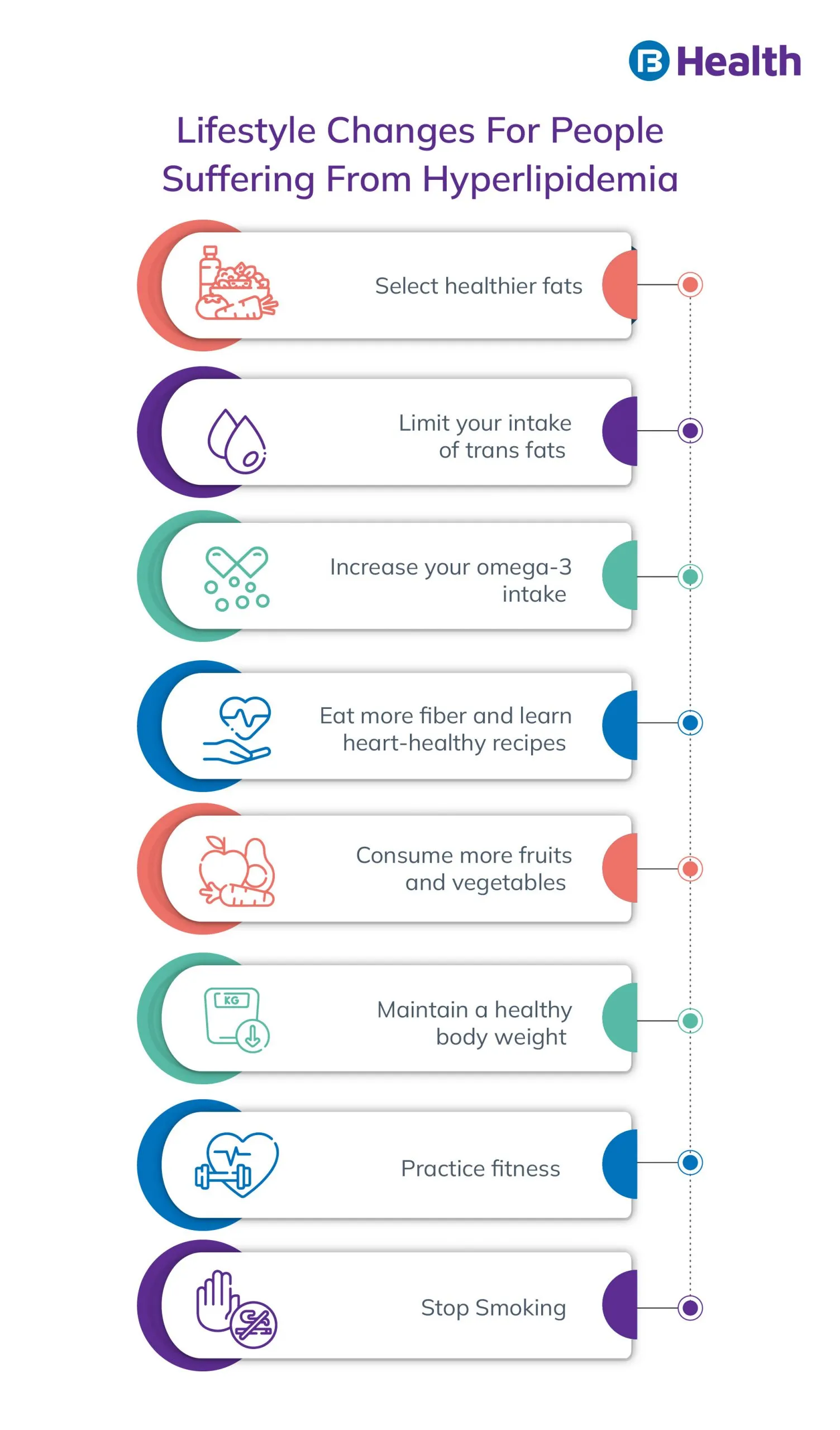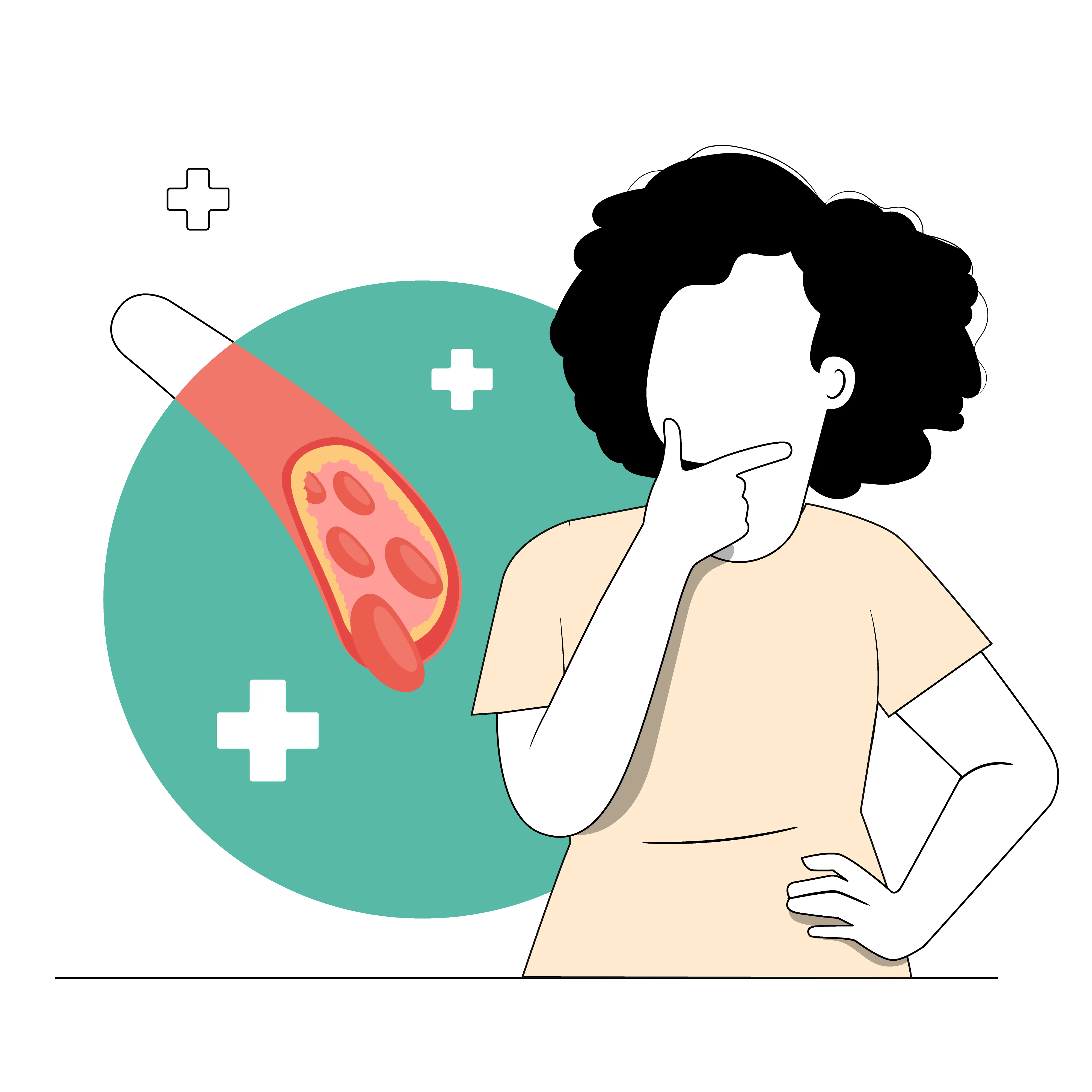Cholesterol | 8 min read
Hyperlipidemia: Symptoms, Causes, Risk, Treatment
Medically reviewed by
Table of Content
Synopsis
Hyperlipidemia meaning high cholesterol is characterised by an excess of lipids or fats in the blood. Because blood cannot easily flow through your arteries, you are more likely to have a heart attack or stroke. Exercise and eating healthy foods can help lower your cholesterol. Some people also require medication. Managing your cholesterol takes time and effort.
Key Takeaways
- Too much cholesterol is unhealthy for the body and the condition of increased fat in the body is called Hyperlipidemia
- Cholesterol levels differ from person to person and one must test their cholesterol every 5 years to keep track
- Some diseases like hypothyroidism, liver diseases, diabetes, etc., cause Hyperlipidemia
Hyperlipidemia is a medical term that describes abnormally high levels of fats in the blood, including cholesterol and triglycerides. Your liver produces cholesterol to aid digestion and to produce hormones. However, dietary cholesterol is also found in foods from the meat and dairy departments. Because your liver can produce all the cholesterol required, the cholesterol found in foods is unnecessary.
Too much cholesterol (200 mg/dL to 239 mg/dL is borderline high, and 240 mg/dL is high) is unhealthy because it can cause blockages in your artery highways, transporting blood around your body. This harms your organs because they do not receive enough blood from your arteries.
Although Hyperlipidemia can be inherited, it is usually caused by lifestyle factors such as an unbalanced diet and insufficient physical activity.
Cholesterol levels by age differ depending also on weight and gender. Because the body produces more cholesterol over time, doctors recommend that everyone over the age of 20 have their cholesterol levels checked on a regular basis, ideally every five years.Hypertriglyceridemia and mixed Hyperlipidemia are two other types of Hyperlipidemia in which cholesterol and triglyceride levels are elevated.
Cholesterol
Cholesterol is a fatty substance that circulates in your bloodstream on proteins known as lipoproteins. Consider cholesterol, a type of fat, to be in the form of lipoprotein cars traveling through your bloodstream.
Types of cholesterol
Low-Density Lipoprotein
LDL cholesterol is bad cholesterol because it can clog your arteries like a large truck that has broken down and is blocking a traffic lane. (High borderline number: 130 mg/dL to 159 mg/dL.) (High: 160 to 189 mg/dL.)
Very Low-Density Lipoprotein (VLDL)
Also known as bad cholesterol because it transports triglycerides, which contribute to artery plaque formation. This is yet another type of traffic snarler.

High-Density Lipoprotein (HDL)
Known as good cholesterol, HDL transports cholesterol to the liver, where it is excreted. This is similar to a tow truck, which removes broken down vehicles from traffic lanes so that vehicles can move. In this case, it allows blood to flow through your blood vessels. You don't want your HDL level to be less than 40 mg/dL.
The most dangerous type of cholesterol is LDL, which causes hardened cholesterol (plaque) deposits inside your blood vessels. This makes it more difficult for your blood to pass through, putting you at risk of a stroke or heart attack. The plaque may become irritated or inflamed, causing a clot to form around it. Depending on the location of this blockage, it can further cause:
- Heart Disease
- Heart Attack
- Stroke
- Peripheral Artery Disease (Pad), which can result in Limb Ischemia or Gangrene.
Hyperlipidemia Causes and Risk Factors
Hyperlipidemia is a cholesterol imbalance in your blood caused by too much LDL cholesterol and low HDL cholesterol to clear it up. Hyperlipidemia is classified into two types: familial and acquired.
Acquired Hyperlipidemia
Most cases of acquired Hyperlipidemia are the result of certain lifestyle factors. Acquired Hyperlipidemia causes could also include medications you're taking or underlying health issues.
Causes of Hyperlipidemia Due to Lifestyle
Lifestyle choices can raise "bad" cholesterol levels while decreasing "good" cholesterol levels. The main lifestyle choices that increase your chances of developing high cholesterol levels are:
- An unbalanced diet
- Insufficient exercise
- Smoking or regular exposure to secondhand smoke
- Being overweight or obese
- Excessive alcohol consumption
Conditions of Health that contribute to Hyperlipidemia
Certain medical conditions like kidney disease can also contribute to high cholesterol levels.
- Diabetes
- Polycystic Ovary Syndrome (PCOS)
- Hypothyroidism
- Liver Disease
- Other inherited conditions, as well as pregnancy, may all play a role in high cholesterol.
Medications that cause Hyperlipidemia
Certain medications could be the reason for Hyperlipidemia causes, such as:
- Birth control pills
- Diuretics
- Corticosteroids
- Antiretrovirals used to treat HIV
- Beta-blockers may occasionally affect your cholesterol levels.
Beta-blockers have little effect on cholesterol levels and are often insufficient to warrant discontinuation.
Familial Combined Hyperlipidemia
Familial combined Hyperlipidemia (or mixed Hyperlipidemia) is a type that can be passed down through your family. It raises cholesterol and triglyceride levels.
People with familial combined Hyperlipidemia frequently develop high cholesterol or high triglyceride levels in their twenties and are diagnosed in their thirties or forties. This condition increases the risk of developing early coronary artery disease and heart attack.
People with familial combined Hyperlipidemia may experience cardiovascular disease symptoms early in life, such as:
- Chest pain at a young age
- Heart attack at a young age
- Cramping in the calves while walking
- Toe sores that do not heal properly
- Stroke symptoms, such as difficulty speaking, drooping on one side of the face, or weakness in the extremities
Hyperlipidemia Symptoms and Signs
Hyperlipidemia symptoms typically do not manifest until it has progressed to the point where people experience emergency complications, such as a heart attack or stroke. These can occur when high cholesterol levels cause plaque buildup in your arteries, limiting or blocking blood flow.
People with a genetic high cholesterol show Hyperlipidemia symptoms like developing waxy, fatty plaques on their skin called xanthomas or cholesterol rings around the iris of their eye called corneal arcus.
Additional Read: Important High Cholesterol SymptomsA simple blood test or VLDL Cholesterol Test will reveal your blood cholesterol levels to you and your doctor.
This test determines your cholesterol levels. A healthcare professional will take a blood sample and send it to a lab for testing before returning to you with a full report.
- Total cholesterol levels
- LDL (low-density lipoprotein) cholesterol
- HDL (high-density lipoprotein) cholesterol
- Triglycerides
Safe cholesterol levels vary from person to person, depending on health history and current health concerns, and are best determined in consultation with your doctor.
Additional Read: Cholesterol Normal Range

Hyperlipidemia Treatment
Lifestyle changes
The first line of treatment for Hyperlipidemia is lifestyle changes. If these are not enough, your doctor may prescribe medications to help you manage your high cholesterol.
Lifestyle changes are frequently essential for managing Hyperlipidemia at home. Even if you have inherited Hyperlipidemia (familial combined Hyperlipidemia), lifestyle changes are still an important part of treatment.
Consume a heart-healthy diet- Making dietary changes can help lower your LDL cholesterol while increasing your HDL cholesterol. Here are some of the modifications you need to make:
- Select healthier fats.
- Limit your intake of saturated and trans fats.
- Increase your omega-3 intake.
- Eat more fiber and learn heart-healthy recipes.
- Consume more fruits and vegetables, beans, nuts, whole grains, and fish in your diet
- Limit red meat as well as processed meats such as bacon, sausage, and cold cuts.
- Consume plenty of healthy fats, such as avocado, almonds, and olive oil.
You could try a heart-healthy eating plan like the Mediterranean diet, which includes many of the nutritious foods listed above.
Maintain a healthy body weight
Losing weight may help lower your total cholesterol levels if you have a high body weight or are obese.
However, you are not required to begin this process alone. You can work with a doctor or registered dietitian to develop an eating plan that works for you and increase your physical activity to burn more calories than you consume.
Additional Read: Obesity: Causes, SymptomsGet Fit
Physical activity is essential for good health, weight loss, and cholesterol control. When you don't get enough exercise, your HDL cholesterol levels drop. This means insufficient "good" cholesterol to transport "bad" cholesterol away from your arteries.
Stop Smoking
Smoking lowers "good" cholesterol levels while increasing triglycerides. Smoking can increase your risk of heart disease even if you haven't been diagnosed with Hyperlipidemia.
Hyperlipidemia Medications
Your doctor may recommend medication if lifestyle changes are insufficient to treat your Hyperlipidemia.
Statins are the first-line Hyperlipidemia treatment. If you are unable to tolerate statins or if they do not reduce your LDL cholesterol sufficiently, mRNA and monoclonal antibody drugs have recently been developed.
Among the most common cholesterol and triglyceride-lowering medications are:
1. Statins
- Atorvastatin
- Fluvastatin
- Lovastatin
- Pitavastatin
- Pravastatin
- Rosuvastatin
- Simvastatin
2. Bile-Acid-Binding Resins
- Cholestyramine
- Colesevelam
- Colestipol
- Cholesterol absorption inhibitors like ezetimibe
- Injectable alternatives to statins, such as alirocumab or evolocumab
- Fibrates, like fenofibrate or gemfibrozil
3. Niacin
4. Omega-3 fatty acid supplements
5. Other cholesterol-lowering supplements
Additional Read: Atorvastatin TabletNew Cholesterol-Lowering Medications
Inclisiran
In the case of Inclisiran, the medication inhibits or interferes with the production of an enzyme known as PCSK9 (proprotein convertase subtilisin Kexin type 9). This enzyme disrupts the LDL receptors in the liver, which are required for the uptake of LDL cholesterol by liver cells.
Ezetimibe and bempedoic acid (Nexletol) (Nexlizet)
Nexletol contains bempedoic acid, which has been shown to inhibit cholesterol in clinical trials. It is intended to be used in conjunction with the maximum tolerable dose of statins.
Nexlizet contains ezetimibe, a cholesterol-lowering drug that works by preventing the body from absorbing cholesterol from food. It is also intended to be taken in conjunction with statins.
Nexletol and Nexlizet both have serious side effects. Your doctor can advise whether one of these medications would benefit your treatment plan.
Alirocumab (Praluent)
PCSK9 inhibitor drugs, such as Praluent, work by attaching to the PCSK9 gene and preventing it from degrading LDL receptors in the liver, which aid in the reduction of LDL cholesterol in the body. In contrast to the new mRNA drug Inclirisan, inhibitors bind to the PCSK9 gene, whereas the mRNA drug prevents PCSK9 production.
Untreated Hyperlipidemia doubles the risk of coronary heart disease compared to people with cholesterol levels within the normal range. Heart attack, stroke, and other major issues can result from coronary heart disease. However, Hyperlipidemia is very curable, and the consequences are frequently avoidable. Making specific lifestyle decisions may help you control your Hyperlipidemia and prevent problems.
You can speak with your doctor about adding medications, such as statins, to help lower your cholesterol and triglycerides to healthy levels if lifestyle changes are insufficient.
To make this process easier, visit Bajaj Finserv Health and get a doctor consultation from the comfort of your home. With the convenience and safety this offers, you can start taking the best care of your health!
References
Disclaimer
Please note that this article is solely meant for informational purposes and Bajaj Finserv Health Limited (“BFHL”) does not shoulder any responsibility of the views/advice/information expressed/given by the writer/reviewer/originator. This article should not be considered as a substitute for any medical advice, diagnosis or treatment. Always consult with your trusted physician/qualified healthcare professional to evaluate your medical condition. The above article has been reviewed by a qualified doctor and BFHL is not responsible for any damages for any information or services provided by any third party.





